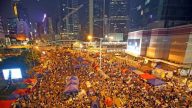【新唐人2014年10月22日讯】香港行政长官梁振英19号指责有外国势力介入香港政治,参与占中,受到占中团体和泛民议员的反驳。20号,他又对外国媒体表示,反对普选的原因,是因为存在让低收入居民成为政治主导声音的风险。这些言论使他连日来陷入争议。
行政长官梁振英19号在接受亚洲电视英文台的录影访问时表示,外国势力一直有介入香港政治,占中行动也有不同国家的外部势力参与,不过他拒绝说明是什么国家,或举出例子。中共外交部发言人华春莹在第二天,再次重复了梁振英的这一说法。
话音一落,“和平占中”发起人之一陈健民,学民思潮召集人黄之锋,壹传媒集团主席黎智英等人,都要求梁振英拿出证据来。陈健民还表示,这显示香港越来越大陆化,当政府无法对付民间力量时,就进行抹黑。
另外,泛民主派26位立法会议员致信给行政长官办公室,谴责梁振英的有关言论,并要求他拿出证据。
真普联召集人郑宇硕:“我们的立场是很简单的。第一、你说有外国势力干预,那就拿出证据来。要是民主运动有任何人犯了法,那你就依法起诉他。没有证据,就不要乱说话,作为一个香港政府的首长,这样说话是非常不负责任。”
真普选联盟召集人郑宇硕教授认为,如果有切实的证据,完全可以依靠国际法处理。
郑宇硕:“外国政府有任何不法的行为,不适当的行为,那中国政府就按外交途径提出抗议,把有关的外交人员驱逐出境。这也是国际惯例么,这也是国际法么,那就按国际法办事。”
尽管所谓“外国势力介入”的说法已经备受争议,梁振英20号晚上在礼宾府接受《纽约时报》、《华尔街日报》和《金融时报》访问时,又做出了另一个令人费解的言论。
梁振英说,公开选举产生下一届香港特首的方法,是不可接受的。部分原因是,这样可能会产生风险,让比较贫穷的居民主导政治。
他说,提名委员会中的“广泛代表性”不是指人数,如果只计人数,那就要和占香港一半人口的,月收入低于1800美元的港人对话,这样会使政策倾斜。
中国问题独立评论员李善鉴:“他说不能够接受民选,是因为如果民选了的话,下层的民众,他们就会主导选举的结果。这个逻辑其实更奇怪,而且这个逻辑应该说,跟共产党当年鼓动群众造反夺权的整个理论,表面上看是完全相反的。”
郑宇硕:“这样的说法明显的是违背了民主的原理。要是依据梁振英这样的解释法呢,那任何国家都不用推动民主了,不用推动一人一票了。那中共历代领导人都是说‘人民才是国家的主人翁’,那梁振英这样子说,是不是说这些中共领导人所说的,都是骗人的话啦?”
那么,梁振英为什么要用上和中共历来言论自相矛盾的理由,来否定普选的可行性呢?
李善鉴:“我觉得他是,完全应该说是在转移话题了。他就是不敢点出来核心,造成这次占中的原因是什么?不就是因为你共产党当时答应港人治港,你答应让港人普选,你现在不敢让,完全自己说的话不算数了。”
郑宇硕教授指出,目前香港社会存在很大不满,根源在于官商勾结,经济繁荣的成果不能让普通市民分享。一方面贫富越来越悬殊,一方面政府的政策却倾向大财团。因此,郑宇硕认为,梁振英这样的态度,事实上就是香港社会矛盾最基本的根源,也是目前占中运动、要求民主运动的最基本动力。
采访/朱智善 编辑/尚燕 后制/郭敬
H.K Chief Executive Mired in Controversy
Foreign Intervention and Poor People in Power
On Oct 19, Hong Kong Chief Executive Leung Chun-ying
accused foreign forces of intervening in Hong Kong’s politics
and participating in Occupy Central.
This was refuted by the groups of Occupy Central
and Members of Pan-Democratic Parties of Hong Kong.
On Oct 20, C Y Leung told the foreign media
that the reason for opposing the current plan
of universal suffrage raised by the Mainland,
is the risk of low-income residents becoming
the dominant political voice.
These remarks cause him more controversy in recent days.
On Oct 19 Chief Executive Leung Chun-ying said
in a video interview with English station ATV,
foreign forces have always intervened in Hong Kong’s politics.
Occupy Central movement is also
involved with external forces of different countries,
but he declined to specify what country or cite examples.
Chinese Foreign Ministry spokeswoman Hua Chunying
repeated this statement the next day.
Just after Leung Chun-ying’sassertion was published,
an initiator of “Occupy Central in peace" Chan Kin-man,
Scholarism founder Joshua Wong,
and Chairman of Next Media Group Jimmy Lai
all required Leung to provide evidence for his remarks.
Chan Kin-man also said that
this shows Hong Kong has become more and more
like Mainland China: when the government was
unable to deal with the civil forces,
then they discredited them.
In addition, 26 Legislative Council members
of the pan-democratic parties sent a letter
to the Chief Executive’s Office,
condemning Leung Chun-ying’s remarks,
and asked him to come up with evidence.
True Universal Suffrage Alliance convener
Joseph Yu-shek Cheng: “Our position is very simple.
First, you said foreign forces intervene,
then please evidence it.
If anyone involved in the democracy movement
violates the law, then you can prosecute him
according to the law.
If you have no evidence, please don’t talk nonsense.
As a head of the Hong Kong government,
to make such remarks is very irresponsible."
Professor Joseph Yu-shek Cheng believes that
if there is tangible evidence, the government can completely
rely on international law to deal with it.
Joseph Cheng: “If foreign governments commit illegal acts,
or inappropriate behavior, then the Chinese government
must protest through diplomatic channels,
and expel relevant diplomats according
to international practice and international law."
Although the “foreign intervention" remark
has been controversial, Leung Chun-ying on the 20th night
in the Guest House made another puzzling remark
to “New York Times", “Wall Street Journal"
and the “Financial Times".
He said that it was unacceptableto allow his successors
to be chosen in open elections, in part because doing so
would risk giving poorer residents a dominant voice in politics.
He said that “broadly representative"
for the Nominating Committee is not numeric representation.
If it is entirely a numbers game and numeric representation,
then obviously you would be talking to half of the people
in Hong Kong who earn less than $1,800 a month.
This would make policies preferential to them.
Mr Li Shankan is an independent commentator
on China’s issues. He says: “He said he did not
accept open election because if elected in that case,
the lower class people will dominate the election results.
This logic is in fact more strange.
Seemingly, this logic should be completely opposite
to the CCP’s theories of agitating
the public to rebel in the early period."
Joseph Yu-shek Cheng: “This statement is clearly contrary
to the principles of democracy.
According to Leung Chun-ying’s interpretation
of democracy, then no country needs
to promote democracy and one-person one-vote.
All the leaders across generations of the CCP said
“the people. are the masters of the country",
so is such a remark from Leung Chun-ying to deny
this statement of the CCP heads?
Or to accuse them of telling a lie?"
So why does Leung Chun-ying use an excuse
which contradicts the principle of CCP leaders,
to deny the feasibility of universal suffrage?
Li Shankan: “I think he completely diverted
the discussion topic. He did not dare
to point out the core of the event.
What are the reasons for this Occupy Central?
It is the promise that the CCP gave in that time
about Hong Kong people ruling Hong Kong.
The CCP made a promise to let Hong Kong people
carry out universal suffrage, but now
they don’t dare to keep the promise.
This is completely breaking the promise."
Professor Joseph Yu-shek Cheng pointed out that at present
considerable dissatisfaction exists in Hong Kong society,
which is rooted in the collaboration
between officials and merchants.
They cannot allow the general public to share
the fruits of economic properity.
On one hand the disparity between rich and poor
is growing, and on another, the government’s policies
gave preference to the big companies.
Therefore, Professor Cheng believes that this attitude
from Leung Chun-ying, in fact, is the basic root cause
of social conflicts in Hong Kong.
This is also the most basic motivation
of the current movement
of Occupy Central demanding democracy.
Interview/Zhu Zhishan Edit/ShangYan Post-Production/GuoJing




















